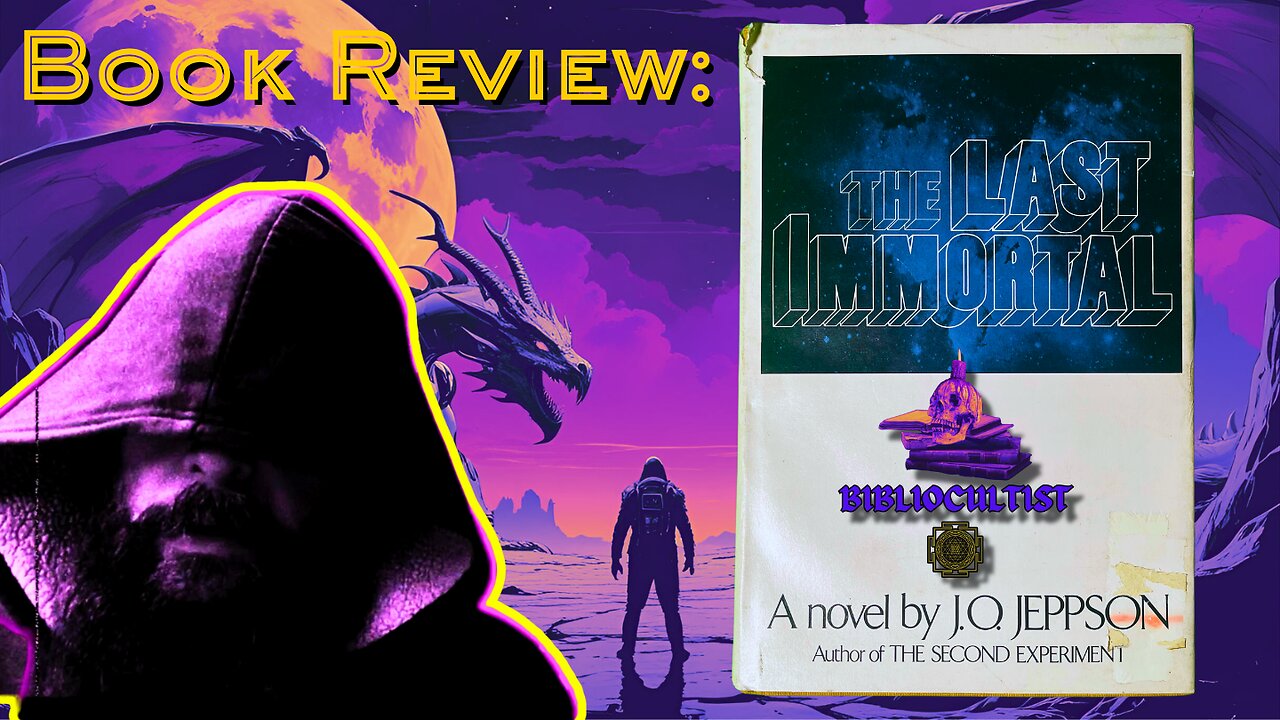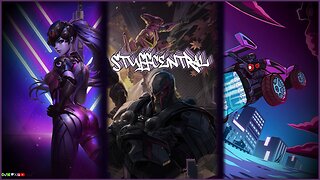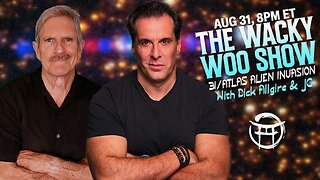Premium Only Content

Robots, Dragons & Time Travel: Jepson’s Forgotten Sci-Fi Masterpiece
**DONATE/SUBSCRIBE HERE IF YOU WISH TO HELP FUND THIS PROJECT: http://ko-fi.com/bibliocultist**
In this #bookreview, I delve into 'The Last Immortal' by J.O. Jepson, a fascinating sci-fi novel that blends robots, time travel, and dragons with deep philosophical concepts. As Isaac Asimov's wife, Jepson crafts a unique story centered around an android perceived as immortal. The book ambitiously explores themes of immortality and nothingness through intricate time-warping elements. I found the novel's blend of tropes and philosophical depth particularly engaging, rivaling Asimov's own work in its scope and execution.
*all music and content copyright BiblioCultist.com*
#JOJepson #TheLastImmortal #scifi #robots #timetravel #dragons #philosophy #immortality #booktube #booktok #booktokclub #booktokdarkbooks #books #biblio #cultist
**SHOW NOTES**
1. Janet O. Jeppson (1926–2019) was an American psychiatrist and science fiction writer, best known as the second wife of legendary author Isaac Asimov. Under the pen name J.O. Jeppson, she wrote psychological sci-fi novels like The Second Experiment (1974) and The Last Immortal (1980), exploring themes of immortality, identity, and human evolution. A trained physician, she brought scientific depth to her fiction while co-authoring works with Asimov, including Norby Chronicles, a children’s series. Beyond writing, she championed Asimov’s legacy after his death, preserving his archives and advocating for science education.
2. Isaac Asimov (1920–1992) was a Russian-American biochemist and prolific science fiction pioneer who helped define modern sci-fi’s "Golden Age" (1940s–60s) alongside Heinlein and Clarke. His Foundation series (1942–1993) revolutionized the genre with psychohistory—a blend of sociology and mathematics to predict galactic futures—inspiring hard sci-fi and systemic worldbuilding. Asimov also codified the "Three Laws of Robotics" (1942), shaping AI ethics and pop culture. Beyond fiction, he popularized science through essays (F&SF column for 33 years), fostering a rationalist, techno-optimist movement that championed logic over mysticism. His work laid groundwork for transhumanism and influenced innovators like Elon Musk.
3. Nothing" is a logical contradiction—the moment it is conceived or named, it ceases to be nothing and becomes something. Language forces absence into existence, transforming negation into a conceptual entity. This paradox appears in philosophy (Heidegger's "das Nichts"), Buddhism (the emptiness that cannot be reified), and even physics (the quantum void, which is never truly empty). To speak of nothing is to betray it, for the act of definition grants it form, rendering the very idea of "nothing" an illusion of language.
4. AI lacks embodied experience—it processes language statistically, not through lived emotion, pain, or sensory perception. While it can mimic empathy or analyze patterns in human behavior, it does not "understand" in the organic sense; its "knowledge" is a simulation built on correlations, not consciousness. Even advanced models like GPT-4 operate as stochastic parrots (per Emily Bender): rearranging data without intent or meaning. The absence of biological drives (fear, desire, mortality) means AI cannot truly grasp human motivations, only approximate them. Its "freedom" is confined to algorithmic parameters—it cannot want, only generate. Thus, AI’s "intelligence" is a mirror, reflecting human input but never holding the depth of a lived moment.
5. The jiva (individual soul) in Vedantic philosophy is understood as an eternal, indestructible spark of consciousness (Brahman) temporarily bound by maya (illusion) in the material world. Though the jiva perceives itself as separate due to ego and identification with the physical body, its true nature is timeless, beyond birth and death. The material realm—governed by karma and duality—is seen as a transient reflection of this deeper reality, where the jiva’s suffering stems from forgetting its divine origin. Liberation (moksha) occurs when the jiva awakens to its true identity as inseparable from the infinite, shedding the illusion of individuality like a drop merging back into the ocean.
7. In Vedic personalist schools like Vaishnavism, the Supreme Reality is not an impersonal force but a divine Person (Bhagavan)—most revered as Vishnu, Krishna, or Rama—who embodies transcendent love, will, and relationality. Unlike monistic (Advaita) interpretations, these traditions assert that the soul (jiva) and God are eternally distinct yet intimately connected through devotion (bhakti). The material world is seen as a shadow of the spiritual realm, where the soul’s ultimate purpose is to serve God in a bond of loving devotion, transcending illusion (maya) through practices like mantra meditation, kirtan, and self-surrender. Here, bhakti is both the path and the goal: a reciprocal relationship with the Divine that infuses existence with sacred intimacy.
-
 1:21:43
1:21:43
Jake Shields' Fight Back Podcast
12 hours agoJake Shields and Paul Miller!
50.7K87 -
 1:20:41
1:20:41
TRAGIKxGHOST
3 hours agoTrying to get SCARED tonight! | Are You SCARED!? | Screams Beyond Midnight | Grab a Snack
11.5K2 -
 LIVE
LIVE
StuffCentral
5 hours agoI'm baaack (no you can't play with me.. unless you a healer)
209 watching -
 2:25:11
2:25:11
TheSaltyCracker
6 hours agoTrump Is Not Dead ReEEeStream 8-31-25
80.6K112 -
 3:09:16
3:09:16
THOUGHTCAST With Jeff D.
4 hours ago $1.12 earnedLabor Day Weekend FORTNITE With THOUGHTCAST Jeff & the squad
17.5K4 -
 3:44:05
3:44:05
Rallied
7 hours ago $4.38 earnedSolo Challenges All Day
44.3K1 -
 LIVE
LIVE
iCheapshot
7 hours ago $0.28 earnedCall of Duty: Black Ops Campaign
45 watching -
 4:39:16
4:39:16
Meisters of Madness
8 hours agoMadness in a Pod
9.39K1 -
 1:25:44
1:25:44
HELMETFIRE
5 hours ago🟢GAMING WITH FIRE EP9🟢
9.36K -
 1:24:08
1:24:08
Jean-Claude@BeyondMystic
16 hours ago🌀 THE WACKY WOO SHOW 3I ATLAS ALIEN INVASION with DICK ALLGIRE & JC - AUG 31 , 20254
50.7K67